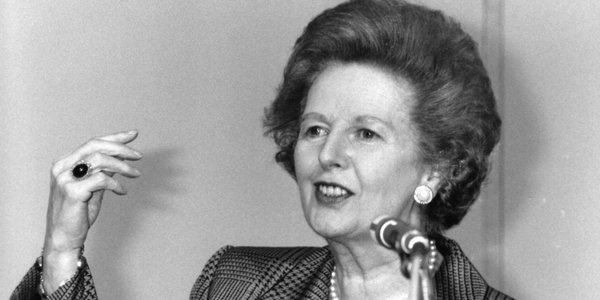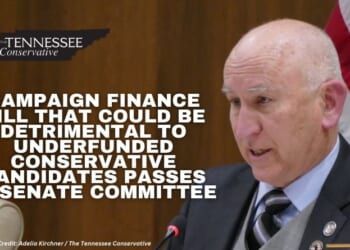It is 50 years this week since Margaret Thatcher was elected leader of the Conservative Party, and to mark the anniversary we are exposing the big lies still told about her. You can read yesterday’s first part here. This second article was first published on June 21, 2019.
BIG lies continually repeated will eventually be accepted by uncritical thinkers. Yesterday I wrote about the big lie that Margaret Thatcher destroyed the post-war consensus, when the unions were actually responsible for this together with a punitive tax regime that discouraged talent and promoted corruption.
Here I deal with the accusation that Thatcher’s policies devastated communities, when corporatist governance and incompetent planning were actually to blame.
The reform of the economy forms part of the second lie, accusing Thatcher of this devastation, particularly of those who depended on employment by state-run businesses. In fact, these communities were already devastated, and had been for years. The corporatist post-war consensus model was based on centralised economic planning, epitomised by the saying ‘the man from Whitehall knows best’. There had been calls for more central planning from the 1930s onwards by political and economic commentators and the planning started in earnest with the return of the Attlee government in 1945. It is therefore reasonable to believe that by the 1970s, whatever condition these state-dependent communities were in was as a direct consequence of state planning. However, it is clear that the planning did not include the contingency that these planned businesses on which the communities apparently utterly depended might not be able to sell to customers at a price the customers were willing to pay.
There was also the issue of the strikes, where customers, faced with unreliable supply, would take their business elsewhere. Working in an uneconomic coal-mine or loss-making steelworks was still hazardous and unpleasant, perhaps made more so by the lack of funds necessary to improve conditions, since all the money had to come from an increasingly-burdened taxpayer. The poor working men in these state businesses in this case were being subsidised to take part in a pointless, monotonous, and dangerous kind of work-based theme park, all according to a central plan made in Whitehall. It was a failure of state planning not to cater properly for change and innovation, but then all socialistic planning has that fault at its heart.
It did not help that the workers from these state-dependent communities were heavily unionised and that strike-backed demands prevented proper management of the state businesses where restricted and obsolete practices persisted with strict demarcation of labour and uneconomic manning levels. The money spent in preventing what was only the inevitable could be used to develop profit-making and more productive businesses, but Thatcher’s corporatist predecessors believed that their economic model would go on for ever, even after the Labour government had to beg for a loan from the International Monetary Fund.
The unions themselves also should have acted in the best interests of their members and arranged a soft landing for them, especially as their own research should have told them the dire future of the state businesses. Finally, Conservative policy towards the state sector was made very clear in a leaked memo called the Ridley Plan one year before Margaret Thatcher became Prime Minister. The unions ignored this warning, preferring confrontation but with no preparation for the consequences should they lose against a fully prepared government that employed a gradualist approach rather than Heath’s sledgehammer of the 1972 Industrial Relations Act. The unions did not look after their members properly and any ‘devastation’ is partially their responsibility.
Participants in the corporatist state cannot claim they were not responsible once corporatism was ditched for free markets. The reason for the ascendancy of Thatcherism was the proven failure of the corporatist model, which had been disintegrating for years and did not provide any kind of future for communities apart from being tied to industries facing collapse or insufficient investment. It is ironic that the political tradition that defended these state industries and the communities they only ever partially supported would turn against them today because of their alleged contribution to global warming. The coal dug up could not be burnt, the steel could not be forged economically due to carbon levies, and the semi-official discouragement of car ownership would result in unsold stock, especially when cars were as poorly built as the Morris Marina.
These communities were promised a socialist utopia, but this was always based on the electorate keeping socialists or house-trained Conservatives in power. The people who blame Margaret Thatcher for the plight of these communities should explain why in the face of this alleged disaster she was re-elected twice. If the advocates of these communities had a good case, this would have resonated with the voter. Instead the voters rejected socialism and the dependency on which socialism thrived for eighteen years until Labour publicly abandoned corporatism and central planning. The devastation of the communities was based on the fact that they relied on the persistence of an ideology whose time had passed, and that was only really popular under the conditions of global war and its immediate aftermath. The unions were in the best position to see the writing on the wall but either ignored it or were not bothered. In the pursuit of a political agenda, they let their members down by not adapting to the economic realities. Instead they tried to impose an economic fantasy that would have been a nightmare for this country, and still might be given the regression of Labour’s ideology to a more primitive state.
The true cause of the alleged devastation of these communities was the intransigence of socialism preventing adaptation in the face of changing circumstances. But the people who blame Mrs Thatcher are hardly going to blame themselves, even though they held power in the corporatist state, so instead they give us this big lie.
Tomorrow: Mrs Thatcher was ‘polarising’ but not ‘divisive’.










